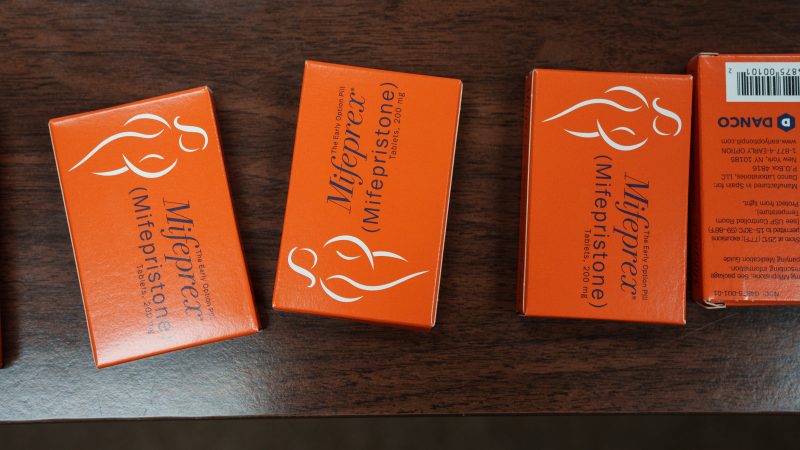
Justice Department asks Supreme Court to ensure access to abortion pill
The Justice Department and the manufacturer of a key abortion drug asked the Supreme Court on Friday to overturn a lower-court ruling that would limit access to the medication, which is used in more than half of all abortions in the United States.
The request creates an opening for the high court to rule on when and how the medication, mifepristone, can be prescribed and distributed. It comes 15 months after the conservative majority overturned Roe v. Wade, eliminating the nationwide right to abortion after nearly 50 years.
Last month, a lower court said it would restrict access to mifepristone after finding the federal government did not follow proper procedures when it began loosening regulations for obtaining the pill in 2016. The conservative U.S. Court of Appeals for the 5th Circuit said the Food and Drug Administration acted unlawfully when it allowed the drug to be taken later in pregnancy, be mailed directly to patients and be prescribed by a medical professional other than a doctor.
The Justice Department, which has joined the drug company in defending existing rules for mifepristone, asked the court to reverse the 5th Circuit’s ruling. Solicitor General Elizabeth B. Prelogar said the drug has been safely used by millions of people over more than two decades, and warned that the lower court’s decision would have “damaging consequences for women seeking lawful abortions and a healthcare system that relies on the availability of the drug under the current conditions of use.”
The decision, Prelogar wrote, threatens to “severely disrupt the pharmaceutical industry and prevent FDA from fulfilling its statutory responsibilities according to its scientific judgment.”
The existing rules for prescribing and distributing mifepristone, part of a two-drug regimen used to terminate early pregnancy, will remain in place while the litigation continues, in accordance with a Supreme Court order issued this spring.
The timing of the filings on Friday means the justices could take up the case in the term that begins the first week in October. If the Supreme Court decides not to take it, the appeals court ruling would stand, and mifepristone would be more difficult for patients to access even in states that have taken steps to protect abortion rights.
The FDA first approved the medication more than 20 years ago, but the legal battle over the pill has intensified as states have moved to limit or ban the procedure after the court reversed Roe. The Florida Supreme Court on Friday was considering the constitutionality of the state’s six-week abortion ban in a case that could affect access across the country.
The drug company Danco Laboratories, which makes mifepristone, defended the medication in its court filing as safe and effective based on clinical trials with thousands of participants. Allowing the 5th Circuit ruling to stand, the company said Friday, would have far-reaching consequences for women, teenage girls and health care providers who depend on the FDA to ensure access to reproductive health care.
How mifepristone is used
1/5
End of carousel
The decision “raises questions about whether a single federal court can limit abortion access in the States that protect it. And it destabilizes the pharmaceutical and biotechnology industries by questioning when scientific studies — accepted by FDA — are sufficient to support conditions of use,” wrote attorney Jessica Ellsworth.
In its opinion overturning Roe in June 2022, the justices said they were returning the issue of abortion to the states. Denying review of the 5th Circuit ruling, Ellsworth said, would undermine the authority of those states that have chosen to expand and protect access to medication abortion.
Danco’s filing also noted that in 2016, the FDA approved a lower dose of mifepristone for terminating an early pregnancy. If the court returns to pre-2016 regulations, the company said, women would be directed to take three times the amount of mifepristone currently listed on the label — and to follow a dosing regimen that is slightly less effective and could lead to more surgical abortions.
If the court makes it more difficult to access mifepristone, patients could use a medication abortion regimen that includes only the second drug, misoprostol.
The challenge to mifepristone was brought by the Alliance for Hippocratic Medicine, an association of antiabortion doctors and others. The group asserted that the FDA did not sufficiently consider safety concerns when it approved the drug in 2000 or when it removed some restrictions years later — allowing the use of mifepristone through 10 weeks of pregnancy, for instance, instead of seven.
The group filed its lawsuit in Amarillo, Tex., where U.S. District Judge Matthew J. Kacsmaryk — a Trump nominee with long-held antiabortion views — is the sole sitting judge. He agreed with the challengers and issued a ruling that for the first time suspended FDA approval of a human drug despite objections from the agency.
The 5th Circuit’s decision last month reversed that part of Kacsmaryk’s order, but agreed with him that the changes starting in 2016 for how the drug was prescribed and distributed — and at what point in a pregnancy it could be used — should not stand.
Those challenging the current rules for mifepristone will be given an opportunity to respond before the justices decide whether to take the case.
“Two courts have now held the FDA accountable for the damage it has done to the rule of law and the harm it has caused to countless girls and women. We hope the Supreme Court does the same,” Erik Baptist, senior counsel for the Alliance Defending Freedom, said in a statement on behalf of the plaintiffs.
Danco’s lawyers told the Supreme Court on Friday that the doctors behind the lawsuit — who do not prescribe mifepristone or regularly treat patients who have taken the drug — do not have legal grounds or standing to bring the lawsuit.
Their “real disagreement with FDA is that they oppose all forms of abortion,” the company said.
